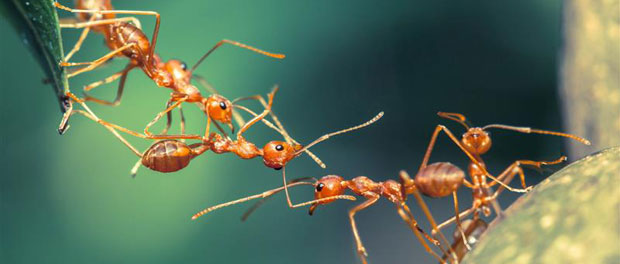
Scientists have thought that differences in traits that exist along a continuum like skin color, height, intelligence, ability to gain weight, and risk for developing diseases were due to genetic and environmental factors. The connection between these two factors and how they interact together, however, has long been uncertain. Researchers from McGill University have conducted an epigenetic study on carpenter ants that reinforces the importance of a key epigenetic mechanism, known as DNA methylation, and supports the hypothesis that environmental factors impact the expression of the aforementioned traits as well as many others. Epigenetic research continues to probe into the mystery of why organisms can display varying phenotypes regardless of sharing an identical DNA code.
By pinpointing a key gene that corresponds to each trait, or phenotype, and the way it is epigenetically affected by the environment, the investigators believe that the level of the particular gene’s expression can be altered, and altered at a specific degree. In essence, these researchers have demonstrated a mechanism by which the environment impacts certain genes and corresponding phenotypes of the organism. This research, recently published in Nature Communications, illustrates just how impactful environmental factors are in conjunction with genetics in determining variation in traits.

The team of McGill researchers, led by Professor Moshe Szyf from the Department of Pharmacology and Therapeutics and Professor Ehab Abouheif from the Department of Biology, has successfully demonstrated the way in which the environment could control the degree a single gene’s level of expression, leading to variations in a complex quantitative trait.
They conducted their epigenetic research on Florida carpenter ants, or Camponotus floridanus. They chose this particular species because for these ants, genes have little influence (only 75 percent related on average) in determining the variation in size of the ant workers of a colony. Also, the Florida carpenter ant genome has been successfully sequenced, making it easier for the investigators to identify the impact of the environment and the effect the epigenetic mechanism, DNA methylation, has on how large or small the ant is.
Epigenetic Mechanism Controls ‘Cascading’ Effect
The researchers found that increasing the amount of DNA methylation of a cell-signaling gene that plays a crucial role in controlling growth, known as Egfr (Epidermal growth factor receptor), resulted in a continuous increase in worker ant size. This occurred despite each ant lacking a genetic difference between the others. Overall, the more methylated the growth-related gene, the larger the ants were.
Sebastian Alvardo, PhD, the co-first author of the McGill study, explains, “Basically, what we found was a kind of cascading effect. By modifying the methylation of one particular gene, that affects others, in this case the Egfr gene, we could affect all the other genes involved in cellular growth. We were working with ants, but it was a bit like discovering that we could create shorter or taller human beings.”
Targeting the Right Gene
Rajendhran Rajakumar, also co-first author of the paper, says, “In the case of growth in ants, it was the Egfr gene which was determinant. But for other complex traits, whether they are involved in the growth of cancer cells in humans or fat cells in chickens, what we now know is that once we have discovered, in each case, the key genetic position that is affected by epigenetic factors we can then influence how much or how little of the gene is expressed with potentially very far-reaching results.”
Abouheif, a professor at McGill University who worked on the study, says, “It’s a discovery that completely changes our understanding of how human variation comes to be. So many human traits, whether they are intelligence, height, or vulnerability to diseases such as cancer, exist along a continuum. If, as we believe, this epigenetic mechanism applies to a key gene in each area, the change is so enormous that it’s hard to even imagine right now how it will influence research in everything from health to cognitive development to farming.”
In a MedicalResearch.com interview with Professor Moshe Szyf, PhD, he describes the unique insight the study offers. “Although we had known that epigenetic differences occur in humans and animals we didn’t have evidence that these changes are behind the natural variation in traits that is observed in humans and animals. Ants are an exciting biological paradigm that exhibits quantitative variations in size and therefore provided a unique opportunity to test this hypothesis.”
Future Directions in Medical Research
According to Professor Szyf, PhD, their study highlights the significant role the environment plays in creating variations in traits. By focusing on deleterious traits, researchers can aim to identify the environments that may be epigenetically leading to undesirable outcomes, and focus on prevention or improvement of such environments.
The study also brings up the possibility of epigenetic pharmacological manipulation which may be able to treat or alter deleterious traits, especially those that increase disease risk.
He cautions, however, that “although ants are interesting we still need to translate this to humans by examining how we can use this concept of ‘inter-individual quantitative variations in epigenetics and traits’ to develop tools that will allow us better preventions, diagnostics and intervention strategies to help the most vulnerable and develop new epigenetic based approaches to treat disease.”
Source: Learn all about it and read more about their findings here: Sebastian Alvarado, Rajendhran Rajakumar, Ehab Abouheif, Moshe Szyf. Epigenetic variation in the Egfr gene generates quantitative variation in a complex trait in ants. Nature Communications, 2015; 6: 6513 DOI: 10.1038/ncomms7513.
References: McGill University. Honey, I shrunk the ants: how environment controls size. McGill University Newsroom. 11 Mar 2015.
MedicalResearch.com Interview with: Prof. Moshe Szyf Ph.D. (2015). Epigenetics, Not Just Genes, Control Many Complex Traits. MedicalResearch.com. 12 Mar 2015.
Hymenoptera Genome Database. Genomic Resources for Camponotus floridanus. Mar 2015.


